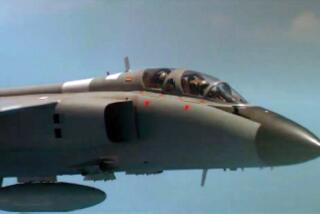New U.S. Envoy Begins Stint in China
- Share via
BEIJING — Former Navy Adm. Joseph Prueher presented his diplomatic credentials to Chinese officials Wednesday, assuming the post of U.S. ambassador to Beijing at a sensitive point in Sino-American relations.
Despite the mutual backslapping following last month’s U.S.-China agreement to pave the way for Beijing’s accession to the World Trade Organization, ties between the two countries remain touchy after a year of crises, from allegations of Chinese spying to NATO’s bombing of the Chinese Embassy in Belgrade, Yugoslavia, in May. Compensation talks in the wake of the bombing concluded here today, seven months after the attack.
Accompanied by all the chief officers of the embassy here, Prueher presented his bona fides to Chinese President Jiang Zemin in a brief ceremony inside the cavernous Great Hall of the People, next to Tiananmen Square.
The retired four-star admiral, who turned 57 three weeks ago, had no immediate comment after the meeting. But after his arrival in Beijing last Thursday, Prueher said he was “delighted to be back” in China and looked forward to meeting with senior Chinese officials whom he considered to be “lao pengyou,” or old friends.
“The relationship between our nations is vital to both of us, to the Asia-Pacific region and to our world as we enter a new century and new millennium,” he said last week. “Our common interests transcend the issues that keep us apart.”
Among those issues are continued U.S. criticism of China’s spotty human rights record, including a recent incident in which a Chinese dissident was allegedly roughed up by police after meeting with the U.S. Embassy’s officer in charge of human rights.
And fallout from the North Atlantic Treaty Organization bombing bedeviled relations for months. Officials hope this morning’s announcement that the two sides settled on terms of compensation for damage in the attack will help close the chapter.
Washington has agreed to pay Beijing $28 million for the destruction of the embassy, which was hit during NATO’s air campaign in Yugoslavia. For its part, Beijing will pay Washington $2.87 million for damage inflicted on U.S. diplomatic missions in China during the anti-American protests that ensued.
The U.S. payments are in addition to the $4.5 million that Washington has already paid China for the deaths of three people in the embassy attack.
“I hope this day marks the beginning of a more positive trend in U.S.-China relations,” said David Andrews, State Department legal advisor and the chief U.S. negotiator in the talks, which took five rounds to complete.
As a career military officer, Prueher at first seemed an unlikely choice for one of the United States’ most sensitive--and most difficult--diplomatic posts. Commentators immediately noted that, as head of the Pacific Command from 1996 until this year, Prueher was in charge when President Clinton dispatched two warships to Taiwan three years ago as a warning to Beijing, which had lobbed test missiles into waters off Taiwan to intimidate voters ahead of the island’s first direct presidential election. China considers Taiwan to be part of its own territory and in rebel hands; long-standing U.S. policy also recognizes “one China.”
But after the incident, Prueher made several trips to China and worked hard to develop friendly relations with People’s Liberation Army officers, becoming a familiar name and face to Beijing’s political and military elite.
One of his toughest tasks will be to convince China that the U.S. harbors no ill intent in pursuing plans to build an umbrella antimissile defense system in the region to protect Japan and possibly Taiwan.
More to Read
Sign up for Essential California
The most important California stories and recommendations in your inbox every morning.
You may occasionally receive promotional content from the Los Angeles Times.














